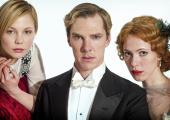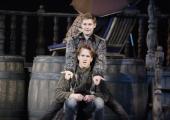Parade's End, BBC Two

An ambitious attempt to bring Ford Madox Ford's magnum opus to the small screen is not entirely successful
Television schedules seem not to matter much any more, since we can now watch on repeat more or less any time we choose. But it still seems strange that the BBC are airing their new five-part period drama, which is part-funded by the HBO network to the tune of £12 million, on a Friday evening in the middle of August – even though it’s turned out to be ideal weather for staying in. And Parade’s End ticks all the right boxes, too – all bar one, perhaps: it’s lovely to look at, it features a top-drawer British cast, and there’s the screenplay by Tom Stoppard.



